Unicorn Fest
Unicorn Fest
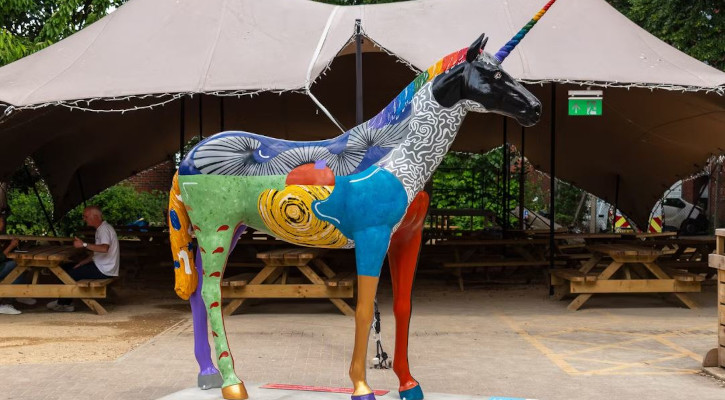
The unicorn at Trinity
We are pleased to be hosting a Unicorn as part of the magical arts trail taking place throughout July and August in celebration of Bristol’s 650th anniversary.
The art trail features 60 life-sized unicorn sculptures that have been individually designed and painted by some of the South West’s leading artists and will be raising money for Leukaemia Care, the UK's leading leukaemia charity.
" I recognise our health care systems aren't exempt from many of the inequalities in our society, and wanted to create a contrasting design that hopes to raise awareness of this while also celebrating the vibrancy of colours, patterns and textures commonly associated with some ethnically marginalised communities." Emma Blake-Morsi, artist Unicorn Fest
Trinity’s unicorn, named 'Silence Provokes', has been painted by Bristol-based artist Emma Blake-Morsi and is inspired by leading research by the British Journal of Cancer on ethnic disparities within cancer patients, with the intention of raising awareness about inequalities within healthcare.
People will be able to visit the Unicorn most days between 9am and 5pm. Throughout the summer holidays we will also be offering a programme of affordable/free to access activities as part of our Children and Young People's programme so if you are bringing family, or young people you care for, and want to plan your visit - click here to find out more.
Click here to find out more about the trail including how to download the app and buy a map.
Please note that Trinity is an active community space, visitors are advised to check our listings as access may be restricted to the site during day parties or weddings.
From the archive: Bristol Caribbean Community Enterprise group
From the archive: Bristol Caribbean Community Enterprise group
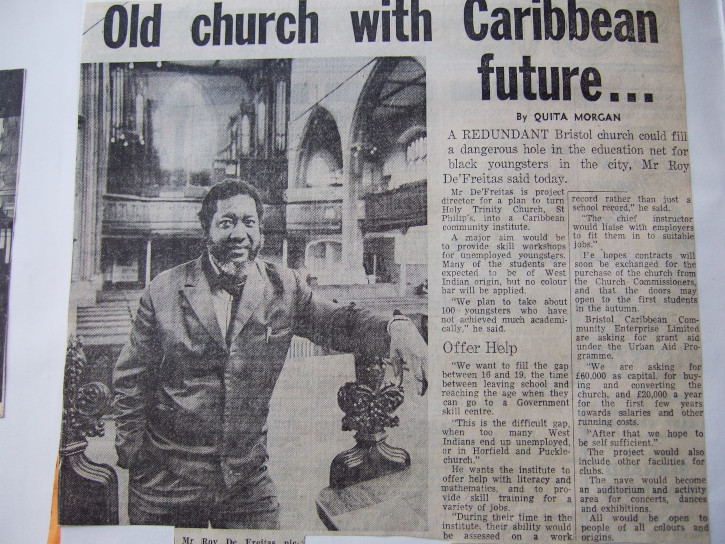
Community leader, Mr Fitzroy (Roy) de Freitas in an extract from a paper. image courtesy of Bristol Archives
To celebrate National Windrush Day we are looking back at our archive to shine a light on the Bristol Caribbean Community Enterprise group (BCCE), who were the first custodians of the Trinity Centre following the deconsecrating of the Holy Trinity church in the 1970's.
The year is 1978, and BCCE opens the 'Trinity Community Institute' as it was then named, on 01 July. The grand opening coincides with St Paul's African-Caribbean Carnival to reflect the group's drive to embrace and celebrate Caribbean culture. The Centre is used every evening of the Festival week.
In October 1978, The Easton Christian Family Centre newsletter contains an update on Trinity Church building: "The old Holy Trinity Church has been taken over by the Caribbean Community Association... They have made extensive alterations, putting in a stage in the main auditorium for a theatre and changing the side aisles into separate small rooms. The vestries have been changed into offices. They are currently negotiating plans to turn the graveyard into a large play area, including tennis courts."
In their annual report of 1978, the BCCE chairman writes, "Our aims and objectives are clear - a centre for youth and community activities; the philosophy is a multi-racial multi-cultural centre. The project is part of this community, and if it is to progress, then the community must believe in it." (As quoted in Venue Magazine, no.70).
BCCE programmed community events with a strong Caribbean influence - sound clashes, dub, reggae nights marking the start of Trinity's sound-system heritage. "Trinity Institute," sometimes also known as "Trinity Hall," provided a space for music and Soundsystem culture, welcoming the likes of Jah Shaka and Quaker City alongside punk and new wave bands, including The Stingrays and New Order.
Sadly, in 1984, BCCE went into receivership, and the building was sold to Bristol City Council in 1985 – but was soon to be opened as a community space once again...
Get involved
We have a series of events and activities to celebrate National Windrush Day. Including partnering with Tamasha Theatre to explore hidden stories from the Windrush generation. Click here to find out more.
Then, throughout the July, August and September Trinity will host film screenings, lunches and other community events and activities. Check our website for listings.
New Mural for Newtown
New Mural for Newtown
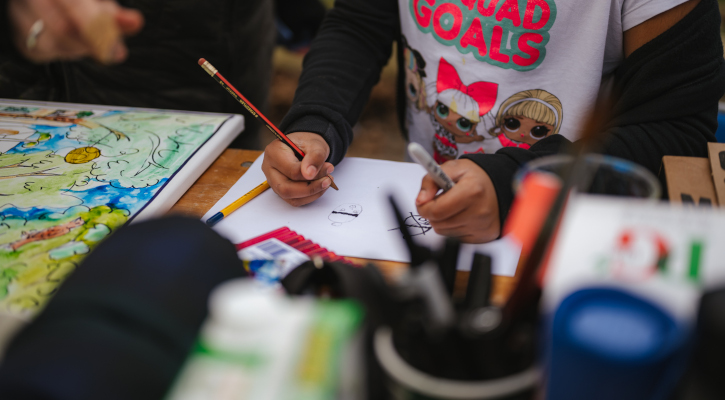
This summer, residents and local children will help create a mural in Newtown as part of Brick Project.
The project, delivered by artists Dan Petley and Fraisia Bruist-Papazian and in partnership with Networn Network, will see individual bricks on a wall opposite Trinity Centre painted – creating a collage of community artwork. Each artwork created on a brick will then be uploaded to the Brick Project Website, and will be labelled showing who created the artwork so that people are able to share their creations. The team are currently delivering Mandala painting sessions at the wall, every Wednesday 5 pm to 7 pm until 2nd August 2023. Please email the team for more information on how to be involved.
Brick project are also looking for residents of Newtown to work on paid job roles, which will involve them working with the project to get more residents involved, the deadline for applications is July 15th 2023.
The project is part of our Community and Neighbourhood programme, and will include free-to-access community workshops throughout June, where Newtown residents can get involved and create their own works of art and helping steer the design of the wall.
The project will also connect with children from three local primary schools who Trinity work in close partnership with. In September, they will visit schools to deliver workshops, helping children shape their ideas for the bricks.
Brick project has previously collaborated with communities across Bristol, including Stokes Croft and Kingswood, as well as Glen Park in Plymouth. To see more of their work visit their website.
Click here to contact Brick Project to find out more or check What’s On for upcoming events.
Jacob's Wells Baths CAT outcome
Jacob's Wells Baths CAT outcome
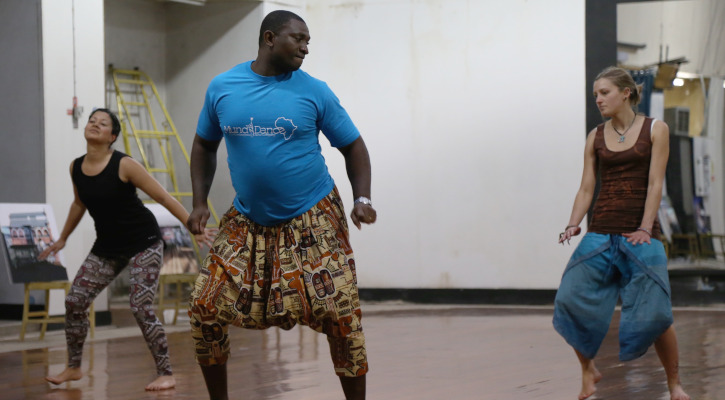
Jacobs Wells Baths Statement, June 2023
As part of our commitment to open working and transparency, we would like to update stakeholders regarding our recently submitted proposal to take on management of Jacobs Wells Baths and reinstate it as a community arts hub for Hotwells.
Following conversation with Bristol City Council in February 2023 to discuss options for the recovery of Jacobs Wells Baths, Bristol City Council (BCC) launched a Community Asset Transfer (CAT) process to formally select a preferred bidder to transform the building.
Trinity submitted a bid that included a fully costed business plan, based on the available criteria published in March. An overview of our proposal to bring the space back into use as a multi-use hub and a full copy of BCC’s responses can be viewed on the links below:
Read our Vision for Jacobs Wells Baths
Read a summary of our CAT application
In spite of indication that Trinity's application scored strongly against the CAT criteria, BCC have written to us in May to state that they will instead be pursuing disposal if we do not submit a joint bid with a second bidder whose legal entity dissolved in March 2023. The wrote to us again in June to ask us to ask us for a further additional bid.
Read BCC responses from May and June.
Speaking in support of Trinity’s plans, Miriam Margolyes – actor and Trinity patron said; “Sadly, arts centres are closing all over the country. It’s something I bitterly regret because I think the arts are the soul of the nation and I think, in our difficult world, people need a place where they can go and learn whatever they want to learn. And talk to each other and have a cup of tea and just relax in a friendly space…I think it’s really important that Bristol should have more of these spaces and that the arts can flourish and nourish us all - because that’s what they do. It’s a beautiful building, and it can be beautiful again.”
Though Trinity were given indication that our bid scored almost full marks, we’ve been told we must back the other bidder with our fundraising and community engagement expertise - even though this is not possible or practical, not least because the legal entity in question dissolved in March of this year.
There are material funds available for a project of this nature and conversations with the community and funders have been hugely supportive. This includes support from a major donor based locally alongside national funders who have granted us permission to apply to their programmes. Sadly we have been unable to progress these applications without Council backing with a leasehold offer in principle.
Emma Harvey, CEO who has been leading Trinity's CAT proposal said;
“It is disappointing given the levels of support and investment that the city has made in certain assets that they are the one stakeholder we've failed to mobilise, even though we only need their support with a leasehold offer in principle and not any funding.
We recognise the difficult position local authorities face in trying to balance budgets. However, this is a classic catch-22 that only they have the power to break - we are simply unable to progress planned grant applications to the next stages and this leaves us without a realistic prospect of success given that the building is currently uninsurable for reinstatement value in its current condition. This presents a real problem for that site given its condition and listed building status.”
With specific funds coming with strict deadlines our window of opportunity to save this building is at risk of closing, unless we can mobilise support from BCC. And by support, I don't mean money - I just mean a letter from someone in charge to says, "yes, we support this proposal". It's really, sadly, that simple.
Fidel Meraz, Trustee for Trinity and Board lead on the Jacobs Wells plans said;
The Board of Trinity expresses its disappointment with the response from BCC. Although both bids may share similarities, they also present meaningful qualitative differences. Trinity is putting forward a long-standing track record of heritage asset conservation and management, a robustly backed-up preliminary plan, and a vision and mission for the project compatible with its charitable objectives, making its proposal incompatible with being merged with a more commercial one.
We have approached BCC for clarity regarding their decision and have requested sight of their assessment and scoring against the published CAT criteria, so that we may seek to understand more clearly their rationale.
We would like to give thanks to all those who have supported us in our work so far in shaping a vision for a community and cultural hub for Hotwells, including local funders who have generously committed their support in principle to enable us to take the chance on this once in a lifetime opportunity. As always, we welcome a conversation with relevant BCC decision makers in order to find a way forward to safeguard this invaluable civic and cultural asset in line with One City objectives.
We will continue to take advice where available and liaise with all stakeholders regarding a positive outcome. We are still committed to progressing our proposal, which we believe to be the strongest plan for building recovery and reinstatement of Jacobs Wells Baths as a community hub for the city.
Get Involved with Volunteer Gardening Sessions
Get Involved with Volunteer Gardening Sessions
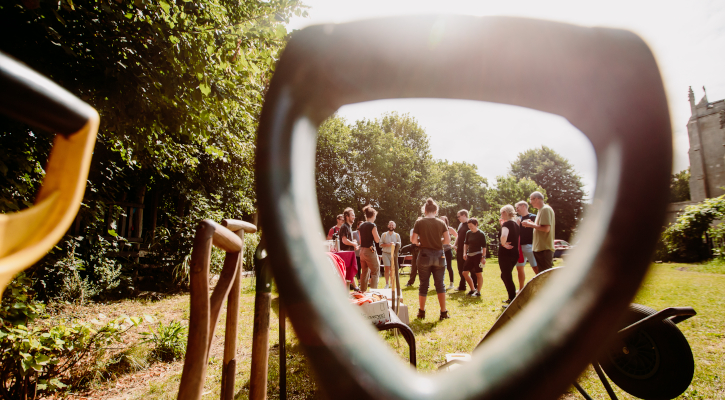
Image Credit: Alastair Brookes
Volunteer Garden Sessions are back at Trinity for the summer, providing practical support for people wanting to learn more about gardening through practical experience of maintaining and upkeeping our beautiful green space. Not only will you have the opportunity to develop your gardening skills, but you'll also learn the art of growing organic produce, all in a friendly and welcoming environment.
During these sessions, you can expect a variety of tasks, including weeding, planting, watering, creating wildlife habitats, and carrying out basic orchard maintenance. While we work together to enhance the garden, we also encourage you to take a moment to unwind, sip on a cup of tea, and enjoy the serene environment in our Community Garden.
Our gardening sessions take place every two weeks on Wednesdays, running from 10:00am to 2:00pm. Led by Trinity's dedicated Garden Team, you'll be working alongside a friendly group of volunteers who share your passion for gardening and community engagement.
No prior gardening experience is necessary as we provide all the training you need. We'll supply the tools, equipment, and beverages, but feel free to bring your own lunch to enjoy during our midday break. Once you become a regular Trinity Volunteer, you'll also have the opportunity to claim back your lunch and travel expenses.
Please note that these sessions are open to individuals aged 18 and above.
If you're interested in taking part, simply reach out to our Garden Project Assistant, Fleur, by emailing her at fleur@trinitybristol.org.uk. Alternatively, you can contact the Trinity Office at 0117 935 1200.
Fleur will be more than happy to chat with you, discuss your interests and needs, and invite you to a taster session to see if our gardening sessions align with your expectations.
At Trinity, we strive to accommodate everyone's individual needs, so please don't hesitate to get in touch in you have additional access requirements.
New Solar Panels Installed at Trinity
New Solar Panels Installed at Trinity
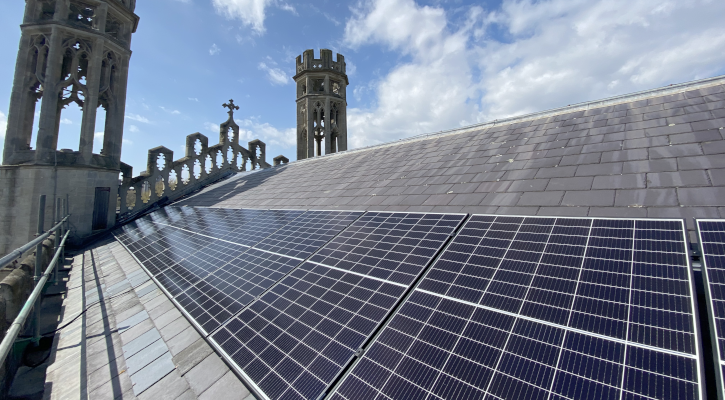
Image Credit: Sam Prosser
At Trinity, we are very excited to share an update of our latest steps towards sustainability and energy efficiency. As an iconic Grade II* listed venue in Bristol, we understand the importance of embracing green solutions and renewable energy. That’s why we have embarked on a project to install new solar panels on our roof, harnessing the power of the sun to create a more environmentally conscious and socially responsible community space.
"Since their installation two weeks ago, the new solar panels have produced a whopping one megawatt hour of energy - this is enough energy to power an electric bike for 50,000 miles, or twice around the Earth's equator"
The first phase of the project involves reviving the existing solar panels, which were installed in 2015 and funded by M&S Energy Fund with match funding from Naturesave Trust. With a south-facing roof that gets a large amount sunlight, there is a massive potential for harnessing this natural resource. The solar panels, connected to an inverter that converts DC electricity into AC, will once again produce power for internal consumption or to be sold back to the grid. Additionally, the relocation of the inverter to a more accessible area ensures ease of maintenance and monitoring.
As part of our commitment to sustainability, we secured funding from Power to Change, WECA Green Business Grant and Crowdfunder donations from members of the public for a whole new system of solar panels. These 27 new solar panels are affixed to the roof at a low level to ensure that the aesthetics of our historic building - in line with its Grade II* listing - remain uncompromised. We are proud to reveal that these panels are high-efficiency, high-spec units, each generating 425 watts of power. With a combined capacity of 11.5 kilowatts, they almost double the energy output of our previous panels. Since their installation two weeks ago, the new solar panels have produced a whopping one megawatt hour of energy - this is enough energy to power an electric bike for 50,000 miles, or twice around the Earth's equator! Equipped with the latest specifications and linked to the internet, these solar panels allow us to monitor energy production in real-time, both on-site and remotely.
By embracing solar power, we are making important steps towards reducing our environmental impact. One of the most significant benefits is the self-sufficiency we achieve by utilising solar energy to power our building during events. From our soundsystems to our light shows, visitors to the Trinity Centre can enjoy the knowledge that the energy behind these events comes directly from the sunshine above. In addition to this, when excess electricity is generated, Trinity has the opportunity to sell it back to the power grid, contributing to a more resilient and sustainable energy network.
The successful implementation of our solar panel installation project would not have been possible without the expertise and guidance of BU Energy Solutions, a local company based in the heart of St Anne's in Bristol. Collaborating with BU Energy Solutions reinforces our commitment to supporting local businesses and nurturing a sustainable economy within our community.
Garden Party May 2023 Recap
Garden Party May 2023 Recap
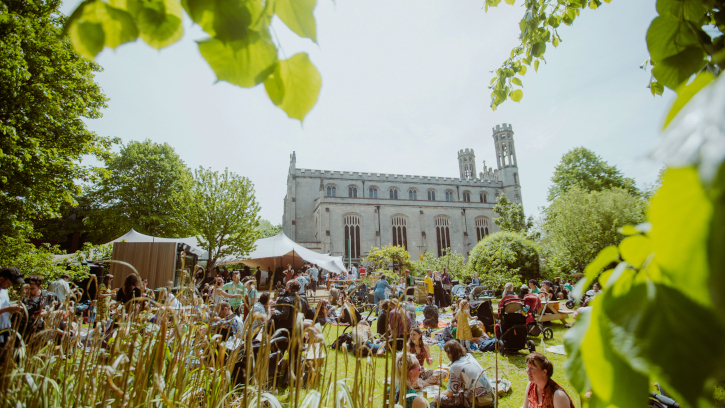
Image Credit: Alastair Brookes
On Sunday 14 May 2023, we opened our gates for Trinity Garden Party - our annual, free, community event which featured a mix of live music, arts, workshops and performances.
The Den, our outdoor stage, played host to an extraordinary lineup of talented artists from Bristol and the South West. A diverse range of genres provided the soundtrack for the day; from the soulful jazz melodies of Laimu to the captivating Ghanaian percussion of Ben Baddoo, and the infectious Nigerian rap stylings of Magugu. We finished proceedings with an energetic performance from our headliners, legendary Ruffneck Ting junglist duo Dazee and Jakes, who have a shared history with Trinity spanning almost 30 years.
Meanwhile, upstairs, Fyfe Hall buzzed with energy as local poets, comedians, and spoken word artists took centre stage. Familiar faces graced us with their presence, and we welcomed fresh, local talent into the mix.
In total, we had performances from 13 artists on the day bringing their talents to the Trinity Centre, captivating the audience from start to finish.
Workshops also took place throughout the day, offering a range of new experiences for the local community to get involved with. Movema, our partners, ignited the Main Hall with a captivating Dance Workshop. The always-popular DMAC Drumming and Storytelling workshop was a hit on the day with a fun and exciting drum circle, while crafts workshops and engaging garden activities delighted the children, as well as a Recycle City workshop which was developed with the local community through the Fun Palaces programme.
We wanted to say a massive thank you to all who made Garden Party this year such a success; from the talented artists, workshop facilitators, stall-holders, local food vendors, the dedicated sound and lighting team behind the scenes, our hardworking bar staff, the entire Team Trinity, and, of course, all of you who joined us on the day. The event saw an incredible turnout, with over 2,200 attendees, and the generosity of your donations exceeded £3000, allowing us to organise more community events like Garden Party.
To stay in the loop with all things Trinity, visit our What's On page for upcoming events. Follow us on Instagram, Facebook, and Twitter, and sign up for our mailing list to stay up-to-date.
In Focus: Tyreke
In Focus: Tyreke
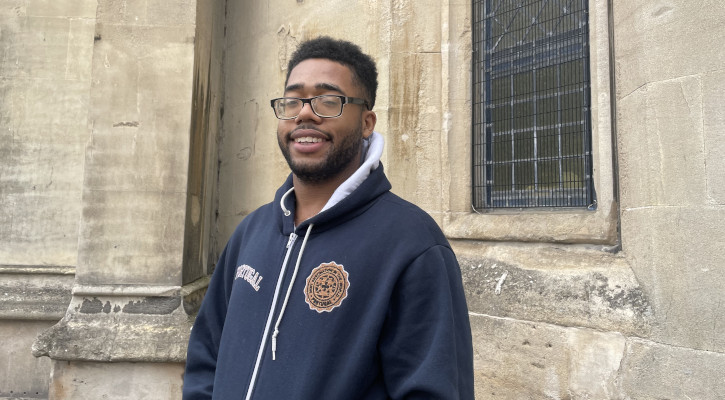
Trinity offers young people aged 16 - 25 the opportunity to take part in drop in music-making sessions, 1-2-1 or small group music sessions in our studios. Through the Music Masterclass series, we connect young people with touring artists who are part of the live-music and club programme at Trinity, as well as industry professionals. The programme is designed to offer young people the chance to develop their skills and experience so they have the opportunity to be part of the cultural workforce of the future.
We caught up with Tyreke, a former participant in Trinity's young people programme, who shares his story of how access to music provision can changed his life for the better.
From a small kid popping into Trinity's doors, Tyreke slowly but surely worked his way up to become a TA and Learning Assistant, all while honing his skills in the creative field. It's amazing to see how Trinity's resources gave him the opportunity to pursue music and to develop his confidence as a musician.
“Trinity really helped me break through and feel a lot more confident in myself as a musician. Having the opportunity to share work that you’ve produced with other people has been a massive boost to my confidence”
One of the biggest benefits of using Trinity's music provision that Tyreke talks about is the technical skills he learned while using music software like Logic. These skills helped him to produce better music and take his work to a new level, all while being guided by Trinity's skilled tutors. Not only that, but he was able to take part in sessions where professionals in the music industry came in and gave him and other young people advice on how to improve their work. Having someone break everything down for him in these sessions was really valuable, as it helped Tyreke to focus on the things he needed to improve.
Another key aspect of Trinity's music provision that Tyreke benefited from was the opportunity to share his work with other people. This was undoubtedly a massive boost to his confidence, as Tyreke talks about become more comfortable giving live demonstrations and encouraging others young people to get involved in music production. It's clear that Trinity helped him to break through and feel more confident in himself as a musician.
Ultimately, Tyreke's experience shows us just how valuable access to music provision can be for young people. Trinity gave him the chance to develop a passion for music, hone his skills, and even pursue freelance work in the creative field. It's inspiring to see how Tyreke's story has come full circle, as he now works to help other young people get involved in music production and to find work in the creative industries by working for organisations like Babassa and South Bristol Youth.
Deliberative Workshops
Deliberative Workshops
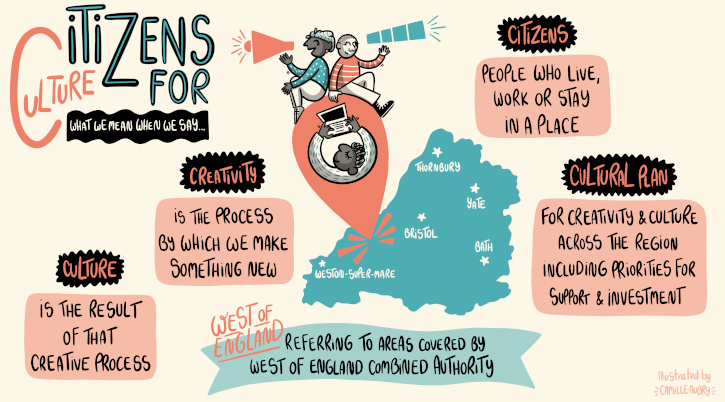
In partnership with St Paul’s Carnival/Trinity and Citizens In Power, we are exploring how to co-create a cultural strategy for the West of England region with citizens.
During this research phase, funded by Calouste Gulbenkian Foundation (UK Branch), we invited a range of collaborators from the sector who place participation at the heart of their practice to hear from some of the best speakers working in democratic decision making right now.
Part 5: Deliberative Workshops
In January and February 2023 we organised three deliberative workshops with the aim of devising a long-term, citizen-led process that will shape a cultural plan for the area.
In our first session, we heard from Sarah James, the Creative and Cultural Programme Lead at West of England Combined Authority. She spoke about the Combined Authority’s Cultural Compact – a group consisting of representatives from four Unitary Authorities (Bath and North-East Somerset, Bristol, North Somerset, South Gloucestershire) that aims to focus and amplify the role of culture in the region as a driver for economic success, placemaking, community cohesion and personal wellbeing. Sarah talked us through the evolving Cultural Plan for the region and how this connects with other active cultural conversations in the area.
The group then briefly discussed the application process for previous rounds of the government’s City Of Culture competition, from the initial expression of interest through to the judges’ panel visit and interviews. It was agreed that it would be up to the Citizens’ Assembly for Culture as to whether an application for future competitions would be relevant or not.
The group then moved on to discuss the idea of Deliberation – a key methodology used in Citizens’ Assemblies. We heard from Professor Alan Renwick (Deputy Director at UCL’s Constitution Unit) who described the key components which lead to deliberative and consensus decision-making and how this differs from a more conventional debating approach.
Following this first session, we felt that it would be good to bring some of the principles Alan Renwick discussed to life with a couple of stories from inside a Citizen’s Assembly. Therefore, to start our second deliberative workshop, Executive Director of St Pauls Carnival and regular Citizens’ Assembly facilitator LaToyah McAllister-Jones shared some stories that helped immerse us back into the world of assemblies, understand more about their conduct, and remind us that there is expertise around these kinds of participatory processes in our teams and region for us to draw on.
Following this, we spent some time delving more deeply into the way Citizens’ Assemblies are organised and delivered. Sarah Allan, one of the UK’s leading experts in Citizens’ Assemblies, who is Director of Capacity Building and Standards at Involve, joined us to explore the way assemlies are designed along with some of the perceived strengths and weaknesses of the assembly model. She delved into the governance of Citizens’ Assemblies, and how the different stages of assemblies work. After considering the core components of a Citizens’ Assembly, we deliberated together to create a list of other exercises or approaches that we thought could add value to the assembly model.
In the final session, we came together to explore our ideas for a citizen-led process for the west of England region. We set out to create a long-term and affordable and citizen-led process that could create a Cultural Plan for the region. Our main questions and themes were: How can the process itself be creative & cultural? How can the process be inclusive and diverse at every stage? Who are the stakeholders in the process and how can we bring them on the journey? Could the assembly have a federal structure with sub-groups to reflect the different areas across the region? Based on the experience and discussions from all three of the deliberative workshops, we outlined a process as a basic prototype, to be tested with citizens and the wider sector in autumn 2023.
Find out more about the project
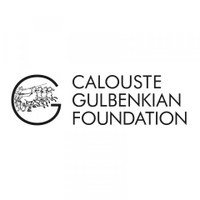
Free cost of living vouchers - CLOSED
Free cost of living vouchers - CLOSED
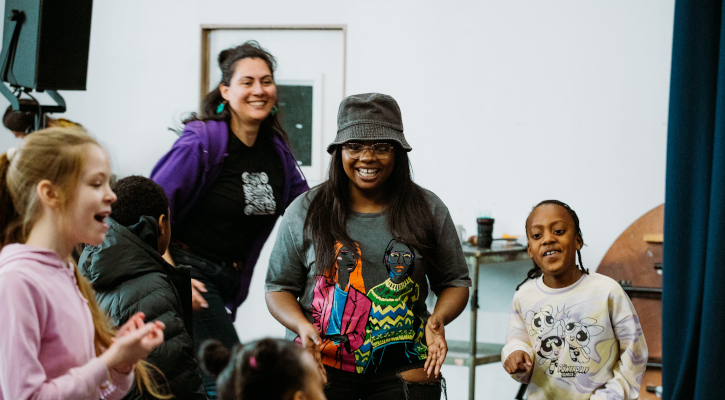
Movema Easter workshop at Trinity. Photo credit Alastair Brooks
Due to high demand, applications are now closed
Trinity Community Arts are offering free supermarket vouchers worth up to £150 to help with the cost of living.
The vouchers are available to anyone aged 18 and over who meets one or more of the following criteria
- lives within a 0.5 mile radius of the centre
- takes part in regular community activity at the centre, including Gentle Dance, ROTN and Hype Dance
- takes part in youth activity at the centre, including Next Gen, Stay and Play and after school clubs
- is a parent/carer of a child in local schools including Hannah More, Easton CE Academy, St Nicholas of Tolentine Primary School, Evergreen Primary school and Central Bristol Children's Centre
The voucher scheme will run in May and June 2023 and is supported by The Society of Merchant Venturers,
Saving Jacobs Wells Baths
Saving Jacobs Wells Baths
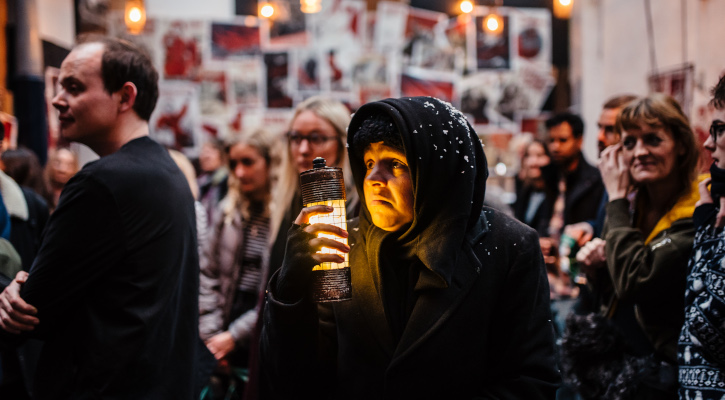
Credit: Ice Road by Raucous - Photographer Jack Offord
Trinity have submitted a bid to Bristol City Council to take on Jacobs Wells Baths as part of a Community Asset Transfer.
Jacobs Wells Baths, a Grade II listed building, opened as a public swimming pool in 1889. In the 1980's following the closure of the pool facilities the site was re-purposed as a community dance centre - which closed its door in 2015. Following this in Dec 2022, due to rising costs, Fusion Leisure Centre announced that it could no longer commit to re-opening the building as a public pool and a public campaign was launched, driven by local residents, to safeguard the future of the building.
Trinity have been working closely with stakeholders to develop a cohesive plan to take on the management of the building and deliver a programme of repairs in order to re-open Jacobs Wells Baths as a community space. Alongside this we have created a detailed business plan that outlines our vision for the space to be economically viable. You can read these documents here and here.
We remain committed to working with Bristol City Council, Councillors, partners and stakeholder groups to develop and deliver a realisable repair and renovation scheme that is both in keeping with the venue’s dance heritage and also responds to consultation and the desperate need for community and youth provision within the locality. This includes hosting events, attending meetings and other activities to gather feedback from the many voices invested in the future of the site. If you would like to keep up-to-date about our plans, sign up to our mailing list here.
Art of Resistance
Art of Resistance
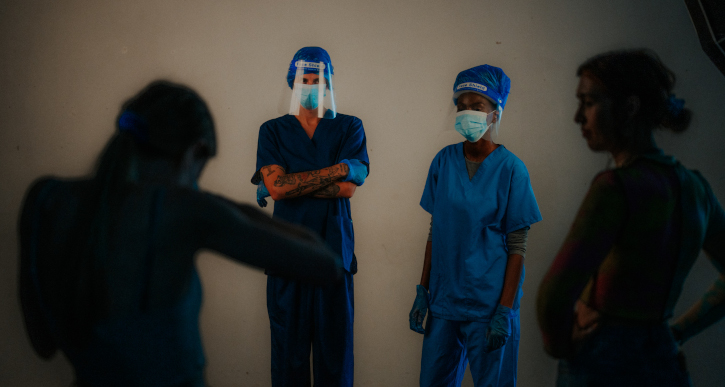
Activism through the lens workshop, photo Khali Ackford
The "Art of Resistance" project, made possible with support from the Heritage Lottery Fund, documented and celebrated the human stories behind activist movements in Bristol. The project focused on the rich histories of five key activist movements from the last 100yrs: Women’s Equality, Workers Rights, Anti-Racism & Anti-Fascism, Counterculture & Reclaim the Environment. Through collecting oral histories and retaining mixed art forms (e.g. poetry, textiles, banners, music, photography) from protest movements we celebrated the rich heritage of Bristol, and its citizens, as a 'city of protest' to educate, inspire and retain this rich history for ours and future generations.
"What I noticed was by taking part in this project, people discovered that there are so many people battling injustices and fighting against social injustices and yet so often don’t see themselves as an activist." Miranda Rae, Facilitator 'Stories of Resistance'
The project, led by historian and writer Dr Edson Burton, programmed an array of activities, including interviews, workshops, performances, film screenings, and exhibitions - engaging over 3226 audience members across 45 events and activities.
As part of the project we created opportunities that enabled first-step engagement with heritage – providing space for people to explore their heritage and learn new skills in research 83 volunteers took part in 69 hours of training delivered by 11 professionals.
Events included 'The Final Frontier', a creative conference of artists and activists and commentators, we welcomed Soundsystem pioneers DJ Stryda, Lioness, Big D and Vibronics for a 'Desert Island Discs' style event in our outdoor venue. We curated three exhibitions' exploring protest through various artforms. 'Snapshots of Resistance' (online & in person) showcased a selection of photographs documenting women protestors & pioneering artists.
We preserved local testimonies of activism across generations through 'I Remember When'. During these sessions we collected memories and artefacts that contributed to our end of project exhibition, book publication and online archive. Participants included Laura Corballis, Deasy Bamford, Gill Haugh, Ros Beauhill, Lilieth Morrison and Colin Moody.
Oral histories collected as part of the project have been captured in the table book ‘Art & Activism Vol 1: A Portrait. Alongside this bringing the project to life, people can explore the stories further via our interactive Heritage Archive, where you can listen to oral testimonies, watch videos and explore photos and other items gathered during two years of the Art of Resistance project.
To find out more about the project read the Art of Resistance report here.

In Conversation: Stryda and Teachings in Dub
In Conversation: Stryda and Teachings in Dub
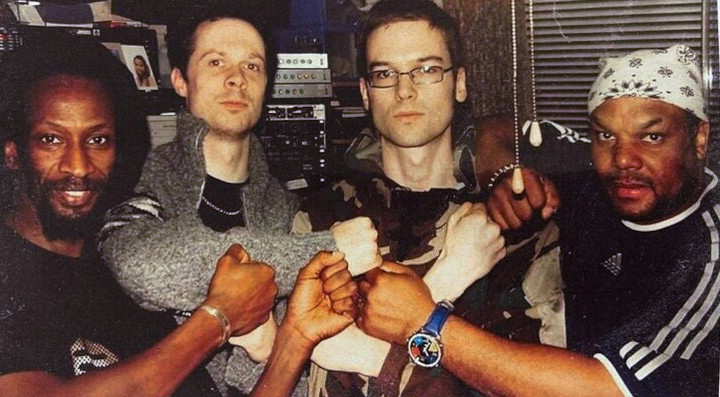
Teachings In Dub has been a Trinity mainstay since 2008. As arguably Bristol's most famous dub night, Teachings is a core part of Trinity's club programme, continuing our heritage of dub and soundystem focused events. Teachings has hosted some of the most influential figures in dub, including Jah Shaka, Aba Shanti-I, Channel One and many more. As Teachings in Dub prepare to return to Trinity on 05 May with Indica Sounds and King Original, we spoke to Teachings co-founder and one half of legendary dub outfit Dubkasm, DJ Stryda, about how Teachings started, their influence on the Bristol music scene, and big plans for the future.
How did Teachings in Dub start?
In 2007 we launched as the downstairs room of a two floored club (now bulldozed) called Clockwork on Stokes Croft. Dubstep legend Pinch ran his infamous event Subloaded in the upstairs room while we did Teachings in Dub downstairs. These events have gone down in history and are remembered by many as some of their most influential events of that time.
"We aim to give elders a space to enjoy the music and vibes they grew up on as well as a window for newcomers to enter a music scene they may have otherwise not even known existed” - Stryda, Teachings in Dub co-founder
When did Teachings move to Trinity Centre?
In 2008 Clockwork announced it was closing, Pinch and I looked into another two roomed venue but none seemed to exist that fitted the vibe so TID and Subloaded went their separate ways with TID moving to Trinity where we've remained ever since.
How do you think Teachings has maintained such a high level of popularity over 15 years?
I'm one half of the duo Dubkasm and have travelled the globe pushing Roots and Dub, in turn this has kept me in tune with what's going on in the scene and helped establish firm relationships in dub which all leads back to TID and the type of cutting edge lineups we offer.
What do you think Teachings in Dub offers to the Bristol music scene?
A space to come and experience the real deal in Reggae soundsystem. We pride ourselves on keeping the tradition alive and not only have two different sounds meeting in the arena but we also offer ital Caribbean food, Arts and Craft plus Record stalls for the full cultural experience.
What's next for Teachings in Dub? Any big plans for 2023?
We have some huge sound meetings scheduled this year, each one is going to be special including later in the year teaming up and celebrating 25 years of Leeds' renowned dub event SubDub.
Teachings in Dub returns to Trinity on 05 May with Indica Sounds and King Original, click here to get your tickets.
Next-Gen Sounds Strikes a Chord with Young Musicians
Next-Gen Sounds Strikes a Chord with Young Musicians
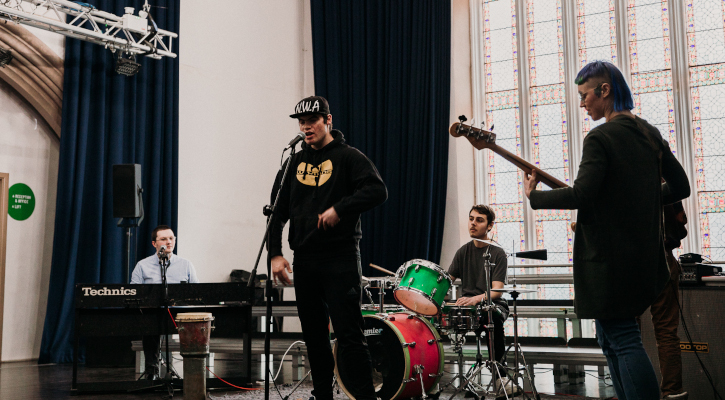
Image Credit: Alastair Brookes
Our Next-Gen Sounds program has wrapped up its first term on a high note. The weekly open access music session for young people has provided a supportive platform for budding musicians to hone their craft and showcase their talent. This term culminated in an impressive performance that highlighted the remarkable progress made by the young musicians.
"Though anxious in the beginning, I feel, after settling, that Next-Gen has become a star part of my weekly routine." - Next-Gen Sounds Participant
The end-of-term performance showcased the progress and achievements of the young musicians. In total, 17 young people engaged with Next-Gen Sounds over the term. During the showcase, the audience was impressed by the quality of the music and the energy and passion of the performers. It was clear that the young musicians had grown in confidence and skill, a testament to the program's effectiveness.
Next-Gen Sounds has proven to be a valuable resource for young musicians seeking a safe and inclusive space to express themselves, develop their skills, and meet other like-minded musicians. With 50% of regular participants being first timers at Trinity, the program has successfully attracted a diverse range of young musicians who may not have otherwise engaged with Trinity’s programme. Participants have expressed their appreciation for the programme, with one stating "I wanted to come back! It’s easy, no judgement, no pressure, it’s fun."
The success of Next-Gen Sounds reflects Trinity’s wider commitment to providing accessible opportunities for young people to engage with the arts. The programme has proven to be an invaluable resource for young musicians seeking a supportive environment to hone their craft. Trinity looks forward to continuing to support the musical aspirations of young people through this exciting programme.
Next-Gen Sounds continues every Thursday - click here to find out how you can get involved.


From the archives: A million bricks of love
From the archives: A million bricks of love
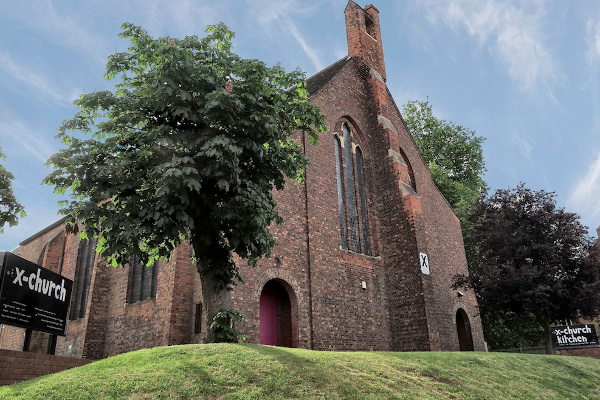
x-church in Gainsborough
As the push continues to #SaveJWB, we look back to Trinity's 2018 Heart & Soul project and our series of talks where both national and international speakers shared their knowledge and experience on the positives and pitfalls of re-imaging historic buildings. In this blog we invited Marcus Hammond, curator of x-church - a community space in Gainsborough, like no other - to come and share its story...
Over a million bricks hold together the love and forward-thinking acceptance of x-church. Marcus Hammond
Marcus Hammond bought a church building in 2006 and the night before he received the keys, the window got bricked. Therefore the first few days of his ownership were spent fixing the windows, and during this time he left the doors open. Children and young people walked right in and started playing in the space. This has lasted 12 years so far. ‘Now’, he said, ‘the building is almost incidental’.
It was interesting to learn that in the same way as the children wandering in, a lot of x-church’s journey happened almost accidentally: the building was described by someone as built in a slum-gothic way, and as well as enjoying the playful amalgamation of two words, Hammond and what was becoming a small team of volunteers decided it would be the name of a youth project.
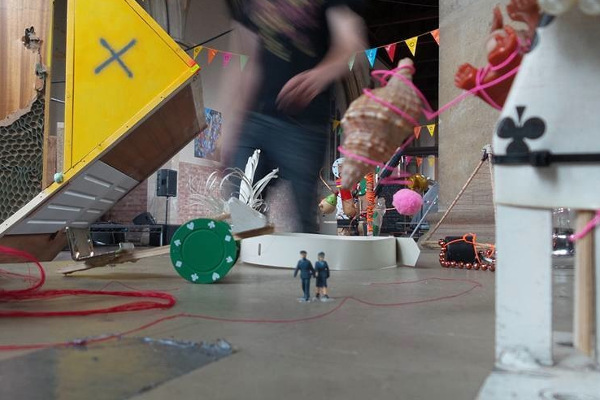
x-church is host to many successful visual art installations
Physically building a place is hard but assembling the people is harder
They created a small dome structure for Slumgothic within the huge church space in which young people’s music and band practice can be contained. Immediately Hammond was building relationships with young people with total acceptance of who they are as individuals. Over time these relationships led to so much mutual respect that Marcus handed out keys to the front door. This helped with practical things such as not having to be there to unlock, but also gives the young people a sense of ownership of the building. With a mixture of surprise and pride, Hammond said, ‘So far, nothing bad has happened.’
The bare-brick architecture has become x-church’s strength and therefore not much has been added to make it more than a vast empty space. Marcus’s view is that physically building a place is hard but assembling the people is harder. For example, Mukhat Dar is open about his poignant story of how not all arts spaces end up in success as he reflects on The Drum Arts Centre (The Life & Death of an Arts Centre).
The x-church team like it when someone comes in and has a grand plan for an exhibition, show or event to hold there, and x-church is welcoming to almost all ideas. In a community like Gainsborough there is not an active interest in art or culture but x- church’s practice of ‘inconveniencing people with art’ proves that if you take it to the people they will engage.
From blocking out all the windows with card in order to turn x-church into a camera obscura to holding 24 hours of drumming for Syria, lots of events and exhibitions have taken place at x-church, some instigated by the young people and some by external artists. ‘Increasingly at x-church', according to Marcus, 'people don’t have a fear of making a fool of themselves.’ I agree wholeheartedly that there is a lot to be said for creating a space in which young people can take risks. In a time when young people are called upon to be available at all times via phones, it is increasingly important to allow freedom in other parts of their lives to benefit their wellbeing and independence.
Through loads of conversations and shared experiences, the lives of individuals and the Slumgothic community has been immeasurably touched. From what I heard at the talk, x-church is an inspiring example of what could be happening to benefit young people all over the world. Over a million bricks hold together the love and forward-thinking acceptance of x-church, but Marcus is not precious about what happens to the physical building, instead it is the people that matter. 'If the building collapsed we could just relocate somewhere else. Even to a field.'
This write up was by Tess Sieling, who was the project intern on the Heart & Soul heritage project. The talk was part of a series exploring the challenges and achievements of transforming and preserving historic buildings and was programmed in collaboration with Bristol's Architecture Centre and the University of West England (UWE).
How to get involved
Click here to sign the Hotwells and Cliftonwood petition to Save Jacobs Wells Baths
Further reading
Read more from our Heart & Soul talk series - Father Paul, Fidel Meraz and Dr Katie McClymont
Read more about the Save Jacobs Wells Campaign here.
Somali Kitchen Family Cooking
Somali Kitchen Family Cooking
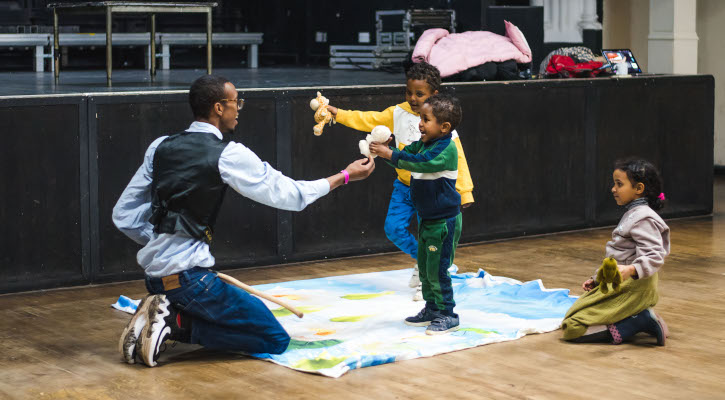
Image Credit: Sophia Stefelle
Trinity collaborated with the local community organisation Somali Kitchen and creative collective YESIDub to programme a series of free-to-access family cooking sessions for local families. The sessions aimed to create a space for connections by exploring Somali culture through food and play.
“I like going to school and coming here afterwards, playing with my mum and cooking”
Taking place over six sessions at Trinity, the team at Somali Kitchen led workshops in cooking traditional Somali food, including ‘Soor’, a dish that is accompanied by a tasty vegetable sauce. Children also had opportunities to get involved with their parents and they learned how to prepare and cook fresh vegetables. Alongside this, YESIDub facilitated the ‘arts corner’, a space for children and parent/carers to take part in craft, games and play activities. Trinity’s Community Producer was on hand throughout to help support the sessions.
The project was a great success, welcoming 11 children alongside their parents/carers. All the families told us that they really enjoyed taking part in cooking and facilitated play. They also shared how they have learned how to cook new dishes including vegetable curry and pancakes. Children shared that they really enjoyed experiencing new things such as chopping the ingredients and sharing their cooking with the group.
The sessions are delivered as part of the wider-inactive Eastside People and Places that is connecting people, reducing loneliness and isolation and helping people feel included and welcome through community-based activity.
From the archives: Father Paul - ‘The Rebel Conformist’
From the archives: Father Paul - ‘The Rebel Conformist’
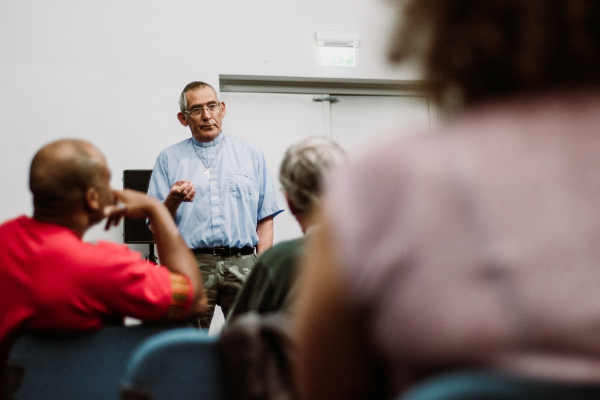
Father Paul moved to Bristol in his 20's and is well loved in St Pauls @Khali Ackford
Before Father Paul’s talk I did not know much about him and his life in Bristol, but afterwards it was clear that he is regarded as family by the community in which he serves.
As the push continues to #SaveJWB, we look back to Trinity's 2018 Heart & Soul project and our series of talks where both national and international speakers shared their knowledge and experience on the positives and pitfalls of re-imaging historic buildings. In this blog we reflect on Father Paul's talk the re-purposing of churches as community spaces.
On the evening of Tuesday 29th May 2018, we were very grateful to Father Paul who stepped in to cover the planned speaker who was unfortunately unwell. He appeared an unconventional priest, wearing camouflage combat trousers and a shirt, very much living up to the talk title ‘Rebel Conformist’.
Before Father Paul’s talk I did not know much about him and his life in Bristol, but afterwards it was clear that he is regarded as family by the community in which he serves. He has touched the lives of a lot of people in Bristol, particularly the St Paul’s area where he has lived and worked most of his life.
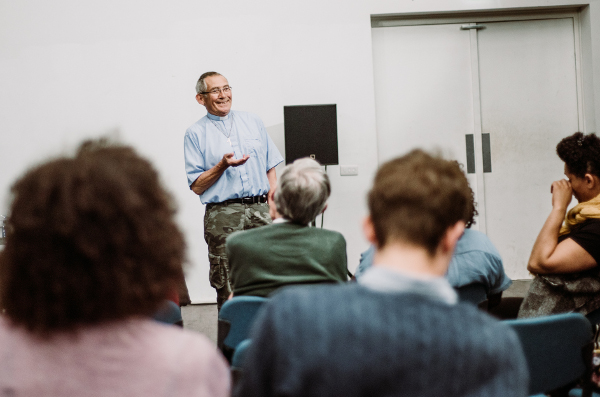
Father Paul talked about the need for the church to respond to contemporary issues @Khali Ackford
Father Paul wants to be able to conduct these ceremonies and to celebrate love without judgement. He told many anecdotes about individuals from the community where he has worked, mostly to show that, "where there is life, there is hope".
Heart & Soul project coordinator, Dr Edson Burton, gave a warm introduction to Father Paul. Several audience members as well as Dr Burton clearly hold him in great affection, indicative of the widespread impact Father Paul has had over the years. In a childhood anecdote, Father Paul remembers growing up in Pontypridd, Wales, wishing he had a brother to play with as he only had one sister. Not until his twenties when he had moved to Bristol and settled in St Paul’s did he realise he was lucky enough to be surrounded by many many brothers and sisters now.
Father Paul started by talking about gay marriage, and the fact that in Wales and Scotland you can have a gay marriage in church, supported by the Church. However in England although you can have a civil partnership or gay marriage, you still cannot conduct these ceremonies as a vicar in a church. It saddens him that there is nothing in the wedding hymn book dedicated to LGBTQ marriage. Father Paul wants to be able to conduct these ceremonies and to celebrate love without judgement. He told many anecdotes about individuals from the community where he has worked, mostly to show that, "where there is life, there is hope".
On many occasions people have gone to Father Paul for help and he has been a huge support throughout the community. These pillars of the community that have not faded despite the move towards communities being started or maintained by technological means.
A lot of people fear that the sense of community relying on face to face contact is being lost due to societal changes- we all spend more time looking at screens. However, Father Paul is an example that where there are people living together in an area, there will always be community leaders and supporters, no matter the advances in technology. It is our human nature.
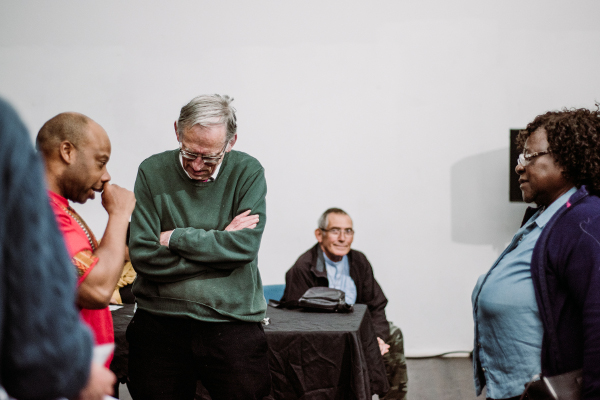
Many local residents attended Father Paul's talk @Khali Ackford
He says; "Things fit together in ways I don’t always understand but don’t object to." I enjoyed Father Paul’s talk because it shed light on the positive influence one person can have in a community. Tess Sieling, project intern
After Father Paul’s talk, he invited a friendly discussion within the group. We moved on to explore what is the role of the Church now? Is it to serve the spirit or to serve the law? There seems to be an openness particularly in Bristol and other large UK cities that is calling for the Church to serve the spirit. In contemporary society, issues that need addressing and the nature of human struggles have been changing, so there is a need for the Church to serve them in an equally contemporary way.
Perhaps a testament to Father Paul’s openness is the fact that at one stage, he was visiting a convicted murderer in prison in Cardiff while also planning the victim’s funeral in Bristol. He says; "Things fit together in ways I don’t always understand but don’t object to." I enjoyed Father Paul’s talk because it shed light on the positive influence one person can have in a community.
This write up was by Tess Sieling, who was the project intern on the Heart & Soul heritage project. The talk was part of a series exploring the challenges and achievements of transforming and preserving historic buildings and was programmed in collaboration with Bristol's Architecture Centre and the University of West England (UWE).
How to get involved
Click here to sign the Hotwells and Cliftonwood petition to Save Jacobs Wells Baths
Further reading
Read more from our Heart & Soul talk series - Dr Katie McClymont, Fidel Meraz and A Million Bricks of Love.
Read more about the Save Jacobs Wells Campaign here.
Mikey Spice
Mikey Spice
We apologise to audiences of the Mikey Spice gig that was scheduled to take place Monday 10th April 2023 at Trinity Centre. We understand ticket holders are disappointed and frustrated that the headline act did not perform. We were equally disappointed given that we have a proud history of hosting Reggae artists.
This event was booked at the venue by a third-party promoter. The show was originally booked at Bristol’s O2 Academy and Trinity took on the show as a last-minute capacity downgrade in good faith, with the hope that this would mean fans who had already purchased tickets would get to see the planned show.
On the night, Trinity staff slowly became aware that the headline act had not arrived at the venue. The promoter was unreachable, and they did not provide us with any indication that there had been this change to the line-up.
Though the event took place, we appreciate this wasn’t the event that people paid for. As such, Trinity will issue refunds automatically to any fans who purchased tickets through our own ticketing platform.
Unfortunately, we are unable to issue refunds to those who purchased tickets through third-party sites. We recommend fans contact their ticket provider directly if you wish to request a refund. We contacted Bristol’s O2 Academy who declined to offer a comment.
We are sorry that our due diligence to check promoter credentials fell short of what is expected of us and we will take greater care in future to ensure a greater degree of care for artists and fans.
We would like to give thanks to the talented support acts who did perform and will do what we can to ensure anyone who performed receives a fair payment We hope that the negative experiences of fans will not reflect badly, either on them as artists or us as a venue.
In Conversation: Kabaka Pyramid
In Conversation: Kabaka Pyramid
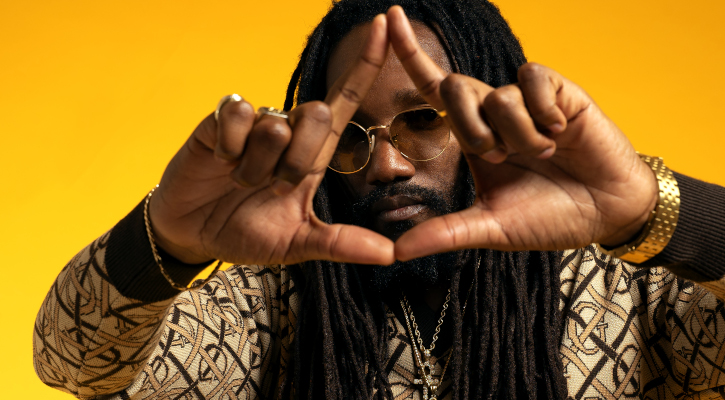
Kabaka Pyramid performs at Trinity on 07 April
Ahead of his show at Trinity on 07 Apr as part of Trinity Presents, we spoke to Grammy award-winning Reggae artist Kabaka Pyramid about performing to UK audiences, the Reggae Revival movement, and much more.
Tell us a little about your musical journey up to this point, and any upcoming plans for 2023
My journey has been great with ups and downs of course, from sound system days to small home studios, starting an independent label, to working with Damian Marley, to winning a Grammy. It’s been amazing. This year we are touring worldwide and continuing to push my album The Kalling.
As a key pillar of the reggae revival movement, how do you feel the international recognition of new reggae artists has impacted the scene as a whole?
I think the international recognition has shone the light on our generation’s movement, and that helped to elevate our status and profile in Jamaica, so overall it’s been a very positive thing.
What have your experiences been like playing for a UK audience? Have you noticed any difference in the atmosphere and energy at UK shows compared to other international audiences?
It depends on where in UK, festivals like Boomtown are similar to other festivals around Europe and even the US, but a club show in South London is closer to the vibes in Jamaica. People react more to the popular songs so I usually have to change my setlist in the UK.
Are there any UK artists that you’d like to work with in the future or other Jamaican artists you'd like to highlight?
Man like Stormzy and Giggs are legends, I also rate Ashley Walters and Kano, looking forward to releasing something with Maverick Sabre and also Plan B - we’ve been in studio before. I like Little Simz's vibe as well.
For someone who’s never seen you perform in person, what can they expect from Kabaka Pyramid live?
My live show is really high energy, a lot of fun for fans, nuff lyrics and some reggae classics mixed, and look for songs off my Grammy album 😉
Kabaka Pyramid will be performing at Trinity on 07 April as part of Trinity Presents - click here to get your tickets.
About Trinity Presents:
This is part of Trinity Presents - our in-house programme of music, bringing world-class artists and emerging talent to inner-city audiences.
Imagining a Future for Jacobs Wells Baths
Imagining a Future for Jacobs Wells Baths
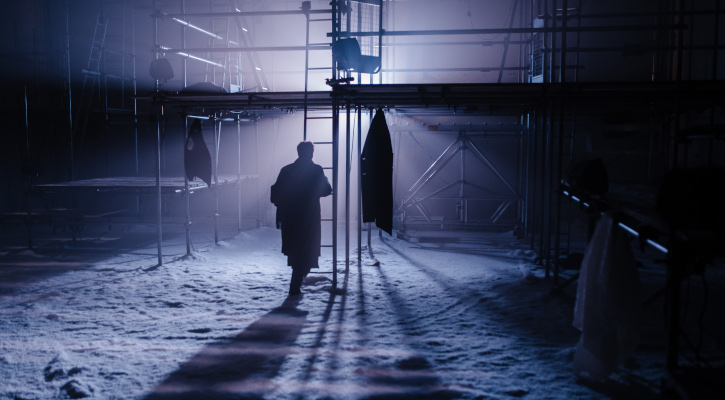
Photo credit: Ice Road by Raucous, Jack Offord, Jacobs Wells Baths
"Bristol is brimming with dance talent in many forms, and it is well overdue for a dedicated space of its own" Deborah Baddoo MBE, Bristol Dance Futures Producer
Former dance centre and Victorian swimming pool, Jacobs Wells Baths has recently been saved from potential disposal by Bristol City Council following their announcement to launch an open process for expressions of interests to manage the building via a Community Asset Transfer.
In 2019-21 we were part of Bristol Dance Futures, a consortium dedicated to building dance profile, capacity and infrastructure in Bristol. The project highlighted the rich potential of dance in the city and created legacies including cross-sector working across health and community development.
We asked Bristol Dance Futures Producer, Deborah Baddoo MBE, to reflect on the project and to share how it could help reimagine a community space, such as Jacobs Wells Baths.
"During my time as producer for Bristol Dance Futures it was clearly evident that there is a huge gap in terms of a dance specific space in Bristol.
Obviously, it is important to bring dance into other organisations who may not normally have access to dance activity, but there is a thriving dance community throughout the city, hiring commercial studios, performing in unsuitable spaces and trying to book spaces in venues for rehearsals, classes and workshops.
Post Covid-19, now more than ever, the powers that be are recognising the valuable role that dance and indeed all the arts have on helping individuals on their journey to wellbeing and the special role that dance has in connecting people, improving mobility, releasing stress and enhancing creativity, to name only a few of the benefits of dance.
A dedicated dance space such as Jacobs Wells Baths has potential to be a place where many exciting initiatives can flourish, a networking space for dance, a rehearsal space, and importantly hub for dance and wellbeing activity in the city.
Dance in Bristol has gone through many changes and manifestations over the last 25 years, but these have always tended to be piecemeal, short-lived initiatives having limited long-term impact for the sector as a whole.
Bristol is brimming with dance talent in many forms, and it is well overdue for a dedicated space of its own. A dedicated space will help enable the dance sector in Bristol to continue to grow and be a catalyst for exciting new developments and a much needed home for dance in this vibrant city."
Deborah Baddoo MBE, Dance Producer
If you would like to join a conversation on what the future for Jacob Wells could be, please click here.




